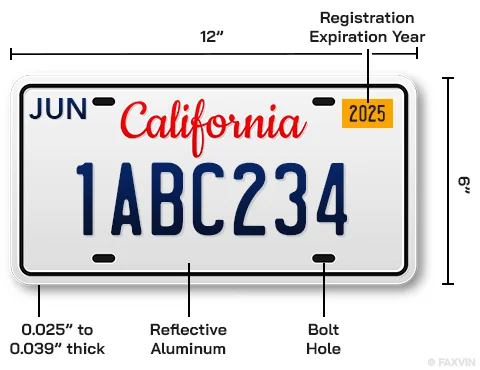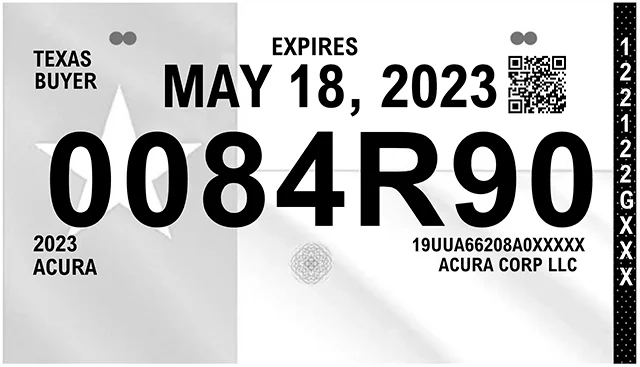Imagine this: you're in the market for a used car, and you've found what seems like the perfect vehicle at an unbeatable price. It's almost too good to be true, right? Well, it might be.
In the world of used car sales, things aren't always as they seem. Mileage rollbacks, title washing, stolen cars, illegal VINs, and unresolved recalls are just a few of the potential issues you could face. In fact, nearly 1 in 4 used cars has some form of negative history lurking beneath the surface.
But don't worry, there's a simple way to protect yourself: a license plate check. By running a quick check on the vehicle's license plate, you can uncover the vehicle's hidden past and make an informed decision about your purchase.
What is a License Plate Search?
A license plate search is a quick and convenient way to access key information about a vehicle you're interested in purchasing. With FAXVIN's free license plate lookup, you can check a car's history in just minutes, without the need to visit your local DMV. Our license plate lookup service pulls data from official, registered sources, ensuring that you receive accurate and up-to-date information.
People commonly use our fast, and user-friendly license plate check to obtain comprehensive details about vehicles they are considering buying. By combining this license plate search with a VIN history lookup and VIN number check (also available for free on our site), you can gain a clear understanding of the vehicle's current specifications and history.
What Will You Learn from Our Reports?
Our full vehicle history report, as seen in the sample reports for Honda and Nissan, provides a wealth of information across various categories:
Accident History
The accident history section of our report will reveal whether the vehicle has been involved in any reported accidents. It includes details about the severity and date of each incident, giving you a clear picture of the vehicle's history. This information is crucial when considering a used car purchase, as accidents can significantly impact a car's value, safety, and long-term reliability.
Reported Odometer Readings
Our license plate search service will provide you with a timeline of the vehicle's mileage, as reported by various sources such as state DMVs, auto auctions, and service centers. By comparing these readings, you can determine whether the odometer has been tampered with, a practice known as "odometer rollback," that can artificially inflate a car's value and hide its true wear and tear.
Recalls & Defects
The recalls and defects section keeps you informed about any manufacturer-issued recalls or defects that may affect the vehicle's safety or performance. This section is based on information provided by the manufacturers. Knowing about these issues can help you make an informed decision about the vehicle's safety and potential repair costs.
Lien & Repossession Records
Our license plate check will reveal if the vehicle has any active liens, which are legal claims against the vehicle that must be satisfied before the title can be transferred. Additionally, you'll be able to see if the car has ever been repossessed due to non-payment or other financial issues.
Theft & Recovery Records
Our license plate search will check National and local databases to determine if the car has a history of theft. If the car was stolen and later recovered, it's essential to know about any potential damage or repairs resulting from the theft.
Flood, Hail, or Fire Damage
The natural disaster damage section allows you to check for any reported instances of flood, hail, or fire damage that could compromise the vehicle's integrity and value. Flood damage, in particular, can have severe and long-lasting effects on a vehicle's electrical and mechanical systems, even if the car appears to be in good condition.
Rental, Taxi, or Police Use
Our license plate search will show if the vehicle has been used as a rental, taxi or police car, each of which can have different implications for its condition and maintenance history. For example, a former taxi or police car may have experienced more frequent use and higher mileage than a personal car.
Service, Inspection, and Registration History
Our license plate lookup will provide you with a detailed record of the vehicle's service history, including any repairs, maintenance, and inspections performed over its lifetime. This information can help you gauge how well the vehicle has been cared for and identify any potential issues that may need to be addressed. Additionally, you'll be able to see the vehicle's registration history, confirming that it has been legally registered and compliant with state regulations.
Title Status
The title status section informs you about any negative branding assigned to the title, such as "salvage," "junk," or "rebuilt." These designations can significantly impact the vehicle's value and insurability. For instance, a "salvage" title history means that the vehicle has been declared a total loss by an insurance company due to an accident, flood, or other damage. A "rebuilt" title indicates that a salvage vehicle has been repaired and inspected, but may still have lingering issues or diminished value.
What are the Data Sources?
FAXVIN gathers key data on cars from a wide range of reliable sources, including:
- U.S. Motor Vehicle Title System;
- Canadian Motor Vehicle Agencies;
- Auto Auctions;
- Insurance Companies;
- Salvage Auctions;
- Collision Repair Facilities;
- Car Dealerships;
- Manufacturers;
- Rental/fleet Vehicle Companies;
- State Inspection Stations.
NMVTIS is a national database maintained by the U.S. Department of Justice (DOJ). It contains information from participating state DMVs, insurance carriers, and salvage yards. Access to this data is governed by the Driver's Privacy Protection Act (DPPA), which safeguards personal information.
Practical Uses of License Plate Lookup Results
The detailed information obtained from a license plate lookup online can be invaluable for car dealers and businesses as well as individual car buyers and consumers.
Dealers and Businesses
- Verify the history and condition of vehicles before adding them to your inventory;
- Make informed pricing decisions based on a vehicle's history and market value;
- Provide transparency to potential buyers by sharing the history report.
Buyers and Consumers
- Identify any potential red flags or hidden issues before making a purchase;
- Negotiate a fair price based on the vehicle's history and condition;
- Ensure that you're making a safe and reliable investment.
Reverse License Plate Number Search
FAXVIN's free license plate check provides a comprehensive report containing essential details about the vehicle in question. The report includes:
- Vehicle Identification Number: The VIN is a unique 17-character code that serves as a vehicle's fingerprint. It contains crucial information about the car's manufacturer, model year, and production details.
- Vehicle attributes: Our report provides an overview of key details such as brand, color, trim, engine, and year of manufacture.
- Check digit verification: The check digit is used to validate the authenticity of a VIN. Our report includes this verification to help you ensure that the VIN is legitimate.
Be vigilant and inspect the odometer closely. Watch for signs of tampering, such as scratches, misaligned numbers, or mileage readings inconsistent with the vehicle's age.
License Plate Design and Formats

Differences Across U.S. States
License plate formats and designs vary across U.S. states, often reflecting the state's nickname, heritage, or famous landmarks. Some states require vehicles to display license plates on both the front and rear, while others only mandate a rear license plate.
Registration Requirements
When moving to a new state, you must register your vehicle and obtain new license plates within a specific period after establishing residency. This timeframe varies by state, ranging from as few as 10 days to as many as 30 days. For example, California requires new residents to register their cars within 20 days, Texas allows up to 30 days, Florida requires registration within 10 days, and New York allows up to 30 days to complete the process.
To register your vehicle, you will typically need to provide proof of ownership (such as a vehicle title or bill of sale), proof of identity, and proof of residency. You may also be required to present proof of insurance, pass a safety inspection, and pay applicable fees and taxes.
Types of License Plates

Most U.S. states issue several types of license plates, including:
- Standard — The default tag design issued to most vehicles
- Personalized — Custom license plates featuring a combination of letters and numbers chosen by the vehicle owner
- Specialty — License plates showcasing specific themes, such as military service, college alumni, or charitable causes
- Disability — License plates issued to individuals with qualifying disabilities, granting access to designated parking spaces
Failure to register your vehicle within the specified timeframe may result in penalties, including late fees, suspension of driving privileges, vehicle impoundment, and fines.
Free vs. Full Reports
- Free License Plate Lookup (no sign-up): Shows core vehicle specs decoded from the License Plate – VIN, make, model, year, trim, body style, engine, assembly country, and vehicle age – plus additional details such as transmission, drivetrain, fuel economy, braking system, and seating (where available). It also validates the VIN (check digit) and indicates whether history records exist.
- Full (paid) report: Adds verified history and risk checks, including title history & brands (e.g., salvage, rebuilt, junk, flood), multi-state title events, accident records, junk and salvage auction entries (often with damage notes), theft records, and lien/impound/export flags, plus an odometer reading timeline that flags potential issues.
How to Run a License Plate Lookup
Checking a vehicle by license plate number with FAXVIN is fast and straightforward:
- Find the plate number on the vehicle or registration.
- Select the state from the dropdown menu.
- Enter the plate number into the search bar.
- Click "Check Plate" to view free basic details such as VIN (if available), make, model, and year.
- Upgrade for a full report with accident history, title brands, mileage, theft, liens, and more.
Get reliable vehicle insights in seconds before making your next purchase.
Conclusion
In summary, performing a license plate lookup online is the right first step for anyone evaluating a used vehicle. By providing access to a wide range of data points, from accident history and odometer readings to lien records and title status, FAXVIN's full reports empower you to make informed decisions and avoid potential pitfalls. With our user-friendly interface and fast, reliable results, you can easily obtain the information you need to proceed with confidence.
Additional Resources for Drivers
- National Highway Traffic Safety Administration
- National Motor Vehicle Title Information System (NMVTIS)
- California DMV - License Plates, Decals, and Placards
- Texas DMV - License Plates
Frequently Asked Questions
Was this article helpful?